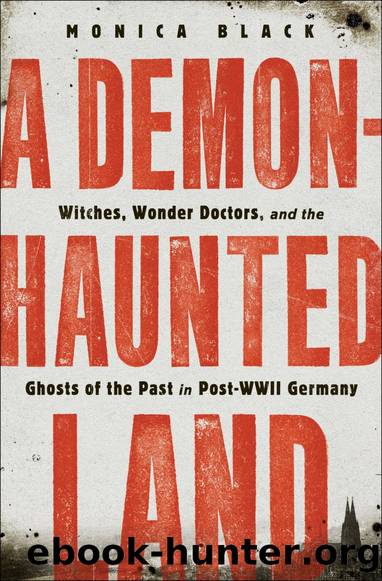A Demon-Haunted Land: Witches, Wonder Doctors, and the Ghosts of the Past in Post-WWII Germany by Monica Black

Author:Monica Black [Black, Monica]
Language: eng
Format: epub
ISBN: 9781250225672
Amazon: B07WZ7TSKV
Barnesnoble: B07WZ7TSKV
Goodreads: 52079597
Publisher: Henry Holt and Co.
* * *
Eberlingâs biography, as revealed in interviews he gave to police and psychiatrists, was very much a twentieth-century German life, one that unfolded over some of the most turbulent years in German history and intersected with politics and war at every turn. The future Hexenbanner, or witch banisher, was born in Schleswig-Holstein in 1908, making him Bruno Gröningâs close contemporary. His parents came originally from Pomerania and West Prussia. He would later say that they were very strictâthey did not allow him âto go out for the first timeâ until he was nineteen and a half, and only then with his older sisters. Eberlingâs older brother became a postal official in Cologne; an artistically inclined older sister married a chamber musician.44 Eberling attended school until he was fifteen, after which he followed his father into carpentry; he had a four-year apprenticeship as a furniture maker.45 In 1928, having achieved journeyman status, he went to the Ruhr region, to Dortmund, a Westphalian city of steel mills and coal mines. He worked as a mines carpenter and also briefly in a furniture factory. In 1929 came the stock market crash and then the Great Depression. Eberling returned to Schleswig-Holstein. A few years later, in the Saarland, he took part in constructing the Siegfried Line, a military fortification extending from Switzerland to the Dutch border. By then, Eberlingâs father, supervising barracks construction on the North Sea island of Sylt, was able to bring his son back north to work again. From 1940 to 1945, Eberling worked on Luftwaffe construction sites. He was briefly a British prisoner of war. Finally, he returned to his hometown to work in his fatherâs carpentry shop. He and his wife had six children.46
From the start, Eberlingâs career as a healer was a religious undertaking. Just before he finished school he started having prophetic dreams, which gave his life a new direction. On this issue, Eberlingâs family was split. His father, whom Eberling described as a socialist, âread scientific books, and after the First World War declared that there could not be a God.â His secular point of view made him contemptuous of Eberlingâs healing practices. Eberlingâs mother, by contrast, was quite religious, and always had an understanding for her sonâs âefforts to heal sick people.â47
During the Second World War, Eberling continued having visions. Some foretold death in the war: âI saw soldiers running over the field, ships, fire falling from the sky, and the women hiding themselves. I saw how people were crushed, and the houses burned.â Eberling also predicted that Germany âwould lose the war, and ⦠on a fifth of May it would be over.â (The Allies formally accepted the German declaration of surrender on May 8, 1945.) Other visions predicted losses closer to home. In 1946, he saw an earthworm lying out, after a rain. He always picked up worms and put them back in the ground, so they did not dry up in the sun or get eaten by birds, but this time he didnât.
Download
This site does not store any files on its server. We only index and link to content provided by other sites. Please contact the content providers to delete copyright contents if any and email us, we'll remove relevant links or contents immediately.
| Ancient & Controversial Knowledge | Ghosts & Hauntings |
| Hermetism & Rosicrucianism | Magic Studies |
| Occultism | Parapsychology |
| Supernatural | UFOs |
| Unexplained Mysteries |
Animal Frequency by Melissa Alvarez(4472)
Sigil Witchery by Laura Tempest Zakroff(4246)
Real Magic by Dean Radin PhD(4129)
Fingerprints of the Gods by Graham Hancock(4004)
Aleister Crowley: The Biography by Tobias Churton(3640)
Journeys Out of the Body by Robert Monroe(3624)
Alchemy and Alchemists by C. J. S. Thompson(3521)
The Rosicrucians by Christopher McIntosh(3519)
Mysteries by Colin Wilson(3454)
Hitler's Monsters by Eric Kurlander(3342)
The Hatha Yoga Pradipika (Translated) by Svatmarama(3342)
Wicca: a guide for the solitary practitioner by Scott Cunningham(3178)
John Dee and the Empire of Angels by Jason Louv(3165)
Infinite Energy Technologies by Finley Eversole(2984)
Book of Life by Deborah Harkness(2939)
Dark Star Rising by Gary Lachman(2867)
The Book of Lies by Aleister Crowley(2846)
Aliens by Jim Al-Khalili(2829)
To Light a Sacred Flame by Silver RavenWolf(2823)
